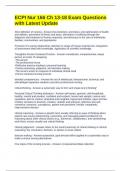ECPI Nur 166 Ch 13-18 Exam Questions
with Latest Update
ANA definition of nursing - Answer-the protection, promotion, and optimization of health
and abilities, prevention of illness and injury, alleviation of suffering through the
diagnosis and treatment of human response, and advocacy in the care of individuals,
families, communities, and populations
Provision of a caring relationship, attention to range of human experiences, Integration
of assessment data with knowledge, Application of scientific knowledge
Thoughtful Person-Centered Practice - Answer-considerate, compassionate, keeps
person at center of caregiving
-The person
-The professional nurse
-Reflective practice leading to personal learning
-Clinical reasoning, judgment, and decision making
-The nurse's action in response to individual clinical need
-Person-centered nursing process
blended competencies - Answer-the set of intellectual, interpersonal, technical, and
ethical/legal capacities needed to practice professional nursing
critical thinking - Answer-a systematic way to form and shape one's thinking"
Personal Critical Thinking Indicators - Answer-self-aware, genuine, self-disciplined,
healthy, careful and prudent, confident and resilient, honest and upright, curious and
inquisitive, alert to context, analytical and insightful, logical and intuitive, open and fair-
minded, sensitive to diversity, creative, realistic and practical, reflective and self-
corrective, proactive, courageous, patient and persistent, flexible, empathetic,
improvement-oriented
clinical reasoning - Answer-a specific term usually referring to ways of thinking about
patient care issues (determining, preventing, and managing patient problems); for
reasoning about other clinical issues (e.g., teamwork, collaboration, and streamlining
work flow); nurses usually use critical thinking
clinical judgement - Answer-refers to the result (outcome) of critical thinking or clinical
reasoning; the conclusion, decision, or opinion a nurse makes
decison making - Answer-purposeful, goal-directed effort applied in a systematic way to
make a choice among alternatives
Five steps of the nursing process - Answer-1) Assessment/data collection
, 2) Diagnosis - Analysis/data collection
3) Outcome - planning
4) Implementation - intervention
5) Evaluation
Nursing Process - Answer-Systematic: part of an ordered sequence
Dynamic: great interaction and overlapping among the five steps
•Interpersonal: human being is always at the heart of nursing
•Outcome oriented: nurses and patients work together to identify outcomes
•Universally applicable: a framework for all nursing activities
Steps in Concept Mapping - Answer-1. Collect patient problems and concerns
2. Collect and analyze, categorize data.
3. create diagram
5. Keep in mind, key concepts,safety, and advocacy
Gibbs Reflective Model - Answer-Description - What happened
Feelings - what were your reactions/feelings
Evaluation - what was bad or good about the experience
Analysis - what sense can you make of the situation
Conclusion - what can be concluded, general and specific
Action plan - what are you going to do differently in this type of situation next time?
Five types of nursing assessments - Answer-•Comprehensive initial - performed shortly
after the patient is admitted to a health care facility or service
•Focused - data about a specific problem that has already been identified
•Emergency - identify life-threatening problems
•Time-lapsed - scheduled to compare a patient's current status to the baseline data
obtained earlier
•Assessment of communities and special populations - assess patient complexity using
the social determinants of health
Assessment - Answer-•Systematic and continuous collection, analysis, validation, and
communication of patient data
Initial performed shortly after admittance to hospital, to establish a complete database
for id of problem/care planning, by the nurse to collect data on all aspects of pt health




